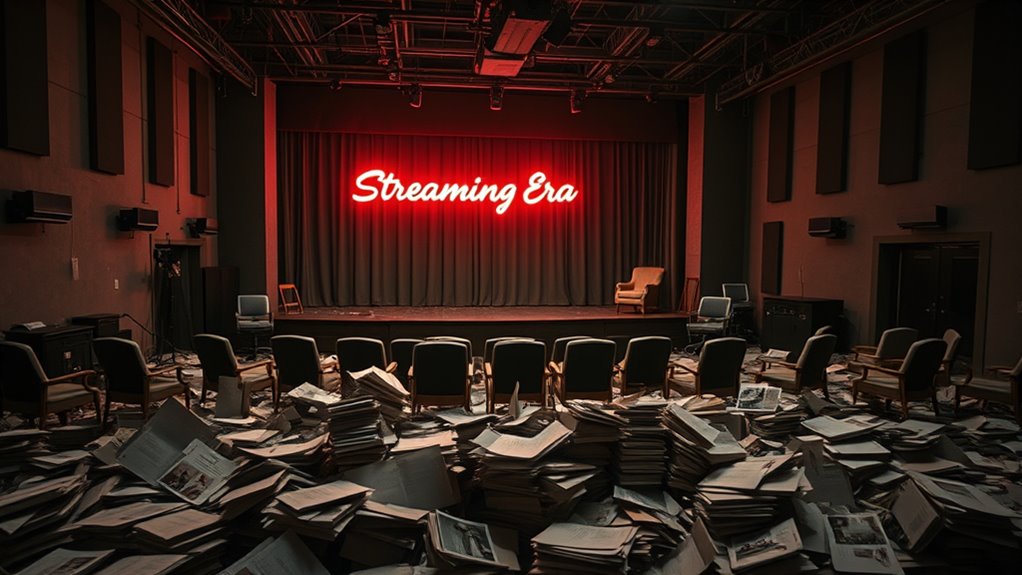The writer-strike in streaming causes significant economic ripple effects that impact you indirectly. Production delays mean fewer new shows and movies, hurting revenue for studios and leading to layoffs. This destabilizes the industry, raising prices for viewers and decreasing entertainment options. The disruption also affects jobs beyond writers, including crews and actors, creating a long-lasting economic impact. To understand how these delays shape the future of streaming and your entertainment, keep exploring this issue further.
Key Takeaways
- Content production delays cause revenue losses for studios and streaming platforms, affecting overall industry profitability.
- Staff layoffs and reduced staffing stem from halted projects, impacting employment across the entertainment ecosystem.
- Fewer new shows decrease consumer options, potentially increasing subscription prices and reducing viewer satisfaction.
- Technological reliance on streaming amplifies economic fallout, as delays hinder digital distribution and monetization.
- Extended strike durations threaten industry stability, risking long-term economic repercussions for creators and investors.

The ongoing writer-strike has considerably disrupted the streaming industry, causing delays in new content and sparking uncertainty among creators and viewers alike. As a viewer, you might notice fewer fresh shows and movies hitting your favorite platforms, but behind the scenes, the impact runs much deeper. The strike centers around issues like writer compensation, which has become a key sticking point. Writers argue that their pay hasn’t kept pace with the rising profits streaming services enjoy, especially as subscription numbers grow. They’re demanding fairer compensation structures that reflect their contributions, particularly given how streaming has shifted the landscape of content creation. When writers walk out, production delays inevitably follow because their work is essential to creating new episodes, scripts, and ideas. Without their input, studios and production companies face significant bottlenecks, pushing back release dates and shrinking the pipeline of upcoming content. This disruption also highlights the importance of content creation as a vital economic driver for the industry. Additionally, the reliance on technology and digital platforms amplifies these issues, as they are integral to modern content distribution and production workflows. The economic impact is further compounded by the fact that many of these technological tools have become industry standards, shaping how content is produced and consumed globally.
These production delays hit the industry’s financial health hard. Studios and streaming platforms lose potential revenue when new content is postponed, and this often results in budget cuts or scaled-back projects. Smaller productions or even some larger ones can be halted entirely, leading to layoffs or reduced staffing. As someone who consumes streaming content regularly, you might not immediately see the direct financial repercussions, but they ripple through the industry, affecting everything from employment to advertising revenue. The delay in content also impacts marketing strategies, as studios can’t promote shows that haven’t been completed, further compounding the economic strain.
The delays stretch beyond just the studios. Production crews, post-production teams, and even actors often rely on the continuity of projects to sustain their livelihoods. When work stalls, it creates a domino effect that hampers the entire ecosystem around streaming content creation. This economic ripple effect can last months or even years, depending on how long the strike persists. For you, it means fewer options for entertainment in the short term and possibly higher subscription prices later, as streaming services attempt to recover losses. The uncertainty around writer compensation negotiations prolongs these delays, creating an unpredictable environment where neither creators nor consumers can be sure when the flow of new content will resume fully.
In essence, the writer-strike’s impact isn’t just about fair pay; it’s about the stability of an entire industry that shapes your entertainment experience. Every delay in production signifies a missed opportunity for new stories, and behind those delays lie complex economic consequences that influence the future of streaming.
Frequently Asked Questions
How Long Will the Writer‑Strike Last?
You’re wondering how long the writer‑strike will last. It’s hard to predict, but negotiations often take weeks or months, especially with industry reforms on the table. If contract negotiations hit snags, the strike could extend longer. Staying updated on both sides’ progress helps. Ultimately, it depends on how willing the writers and studios are to compromise, shaping the duration of this ongoing industry dispute.
Will Independent Creators Be Affected?
You might think independent creators aren’t affected by the strike, but fan support plays a vital role in their sustainability. When industry delays occur, audiences often turn to indie content, boosting their visibility and income. While the strike’s primary impact hits big studios, your support helps keep independent creators thriving, ensuring their work continues. Staying engaged with diverse creators fosters a healthier creative ecosystem and promotes long-term creator sustainability.
Are There Alternative Income Sources for Writers?
You can explore alternative income sources by negotiating better royalty deals and seeking freelance opportunities. By focusing on royalty negotiations, you might earn residual income from your work, reducing reliance on traditional streaming gigs. Additionally, freelance work in writing, editing, or content creation can provide steady income, especially when streaming opportunities are limited. Diversifying your income streams helps you stay financially resilient during industry disruptions.
How Does the Strike Impact Global Markets?
You might not realize, but the strike causes a financial ripple across global markets. When writers halt work, production delays lead to reduced content, impacting advertising, box offices, and streaming revenues worldwide. This market instability can trigger investor concerns, affecting currency values and stock prices. As a result, the economic ripple extends beyond entertainment, influencing various sectors and creating uncertainty for businesses reliant on media and entertainment industries.
Will Streaming Platforms Change Their Policies?
You wonder if streaming platforms will change their policies. They’re likely to pursue payroll reforms to address creator demands and improve worker conditions. Licensing negotiations could also become more flexible, aiming for better terms that benefit both sides. These changes might help prevent future strikes, showing that platforms are adapting to industry pressures. Ultimately, streaming services will probably refine their policies to balance profitability with fair treatment for content creators.
Conclusion
As the curtain falls on this strike, remember that even the smallest ripple can stir the entire pond. Like Icarus soaring too close to the sun, the fallout reminds us that beneath the flashy surface, unseen currents shape our world. Your support and awareness are the wings that help navigate these turbulent times—keeping the spirit of creativity alive. Stay tuned, stay informed, and watch how the unseen forces of this strike quietly craft tomorrow’s entertainment landscape.
Amina brings over a decade of journalism experience to her role as Editor-in-Chief. Under her leadership, Exquisite Post has flourished, maintaining the highest standards of integrity and excellence. Amina’s commitment to truth and her visionary approach guide the editorial team in producing impactful news stories that resonate with our audience.










